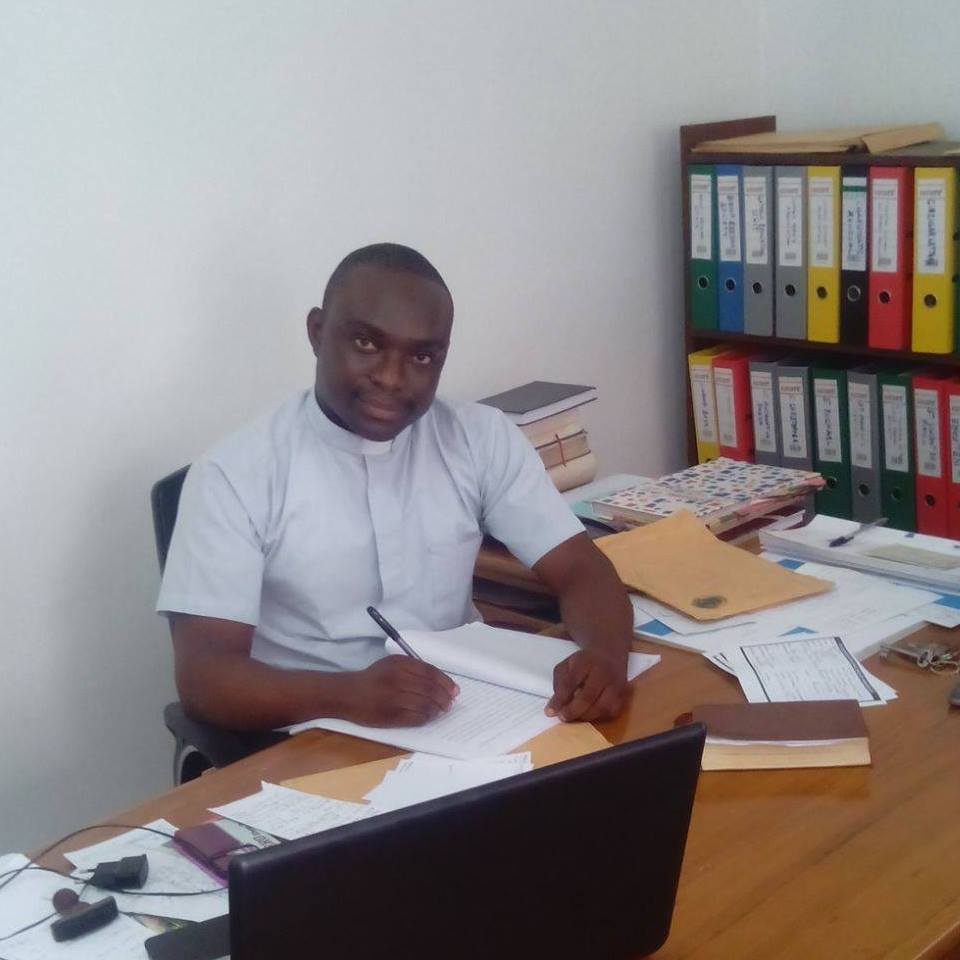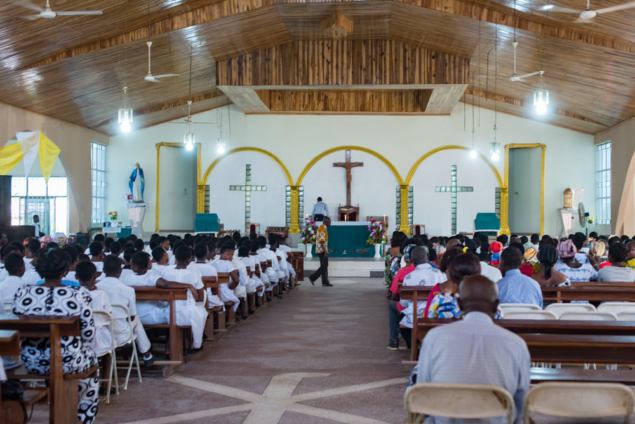Following the 10th presidential address on the Covid-19 pandemic in Ghana and the directive for the gradual easing of social gathering, there have been some mixed reactions by the public.
Some are of the view that easing the restrictions on social gatherings by limiting the assembly to 100 people isn’t the best since the Covid-19 cases keep increasing with the passing of the day.
They argue further that with the “typical Ghanaian attitude”, it will be difficult to strictly go by this directive as to who should be dropped or added to the number 100.
Again, they maintain the issue of registering people for social gatherings or church service may not only be burdensome but also cumbersome.
There are some too who are of the view that this presidential directive on church service during this pandemic is not only feasible but also plausible; if and only if, it is well planned and executed by the churches, nay the various religious bodies.
The Catholic Mass
The Catholic Mass, typically the celebration of the Eucharist, is the central act of worship of the Catholic Church.
And the Eucharist according to Catechism of the Catholic Church is the source and summit of the Christian life (CCC.1324).
This means that the life of the church hinges on the celebration of the Mass.
However, there is a cap on the number of Masses that a priest can celebrate within a day, “three-Mass limit”.
The 1983 Code of Canon Law stresses that “if there is a shortage of priests, the bishop can allow priests to celebrate twice a day for a just cause or if necessity requires it, even three times on Sundays and holydays of obligation” (no.905.2).
The Presidential Directives and the Catholic Mass
Now with this presidential directive on church service in this Covid-19 era, the question that many are asking is that churches with large congregants will have difficulty, considering the fact that each priest has a limited number of Masses to celebrate a day.
Some are also of the opinion that priests are going to come under intense pressure in having “marathon Masses” in order to serve as many as possible and that doesn’t augur well for the health of the priests.
It is on the basis of these arguments that I would like us to examine critically the issue of Anticipatory Mass.
Anticipatory Mass
The anticipatory Mass was first instituted for the specific purpose of providing a time for Catholics who genuinely are unable to be at Sunday Mass because of employment and was actually discouraged as a “Mass of Convenience” to the general public (obviously that did not work).
It is the same in content as the ordinary Sunday Mass, and maybe legitimately celebrated anytime from 4:00 p.m. onward on Saturday evenings.
Biblical Basis
Genesis 1:5 it reads: “Evening came, and morning followed—the first day.” The phrase is repeated after each of the first six days of creation, giving rise to the Hebrew definition of a day as measured from one desert sundown to the next.
Examples in both Testaments testify that time makes a significant shift at sundown: the Temple is closed as shadows lengthen, or crowds bring their sick to Jesus as night falls. Even Easter is counted as “the third day” when the women approach the tomb under cover of darkness.
To be on the safe side in observing erev (Hebrew “evening”), rabbis say one has to wait for three stars to appear in the sky.
When you think about it, the concept that the a.m. (ante meridiem, Latin for “before noon”) period begins at midnight is not much more than a decision. The day has to start somewhere.
Some Biblical References: Genesis 1:5, 8, 13, 19, 23, 31; Leviticus 23:5, 32; Nehemiah 13:19; Matthew 28:1; Mark 16:1-2; Luke 4:40; 2 Peter 1:19
Historical Perspective
Jewish practice carries over in the anticipatory Mass for Sunday, or the Vigil Mass of a feast.
In 1969, Paul VI wrote that ”the observance of Sunday and solemnities begins with the evening of the preceding day.”
Although this was a moto Proprio (personal papal initiative), it built on formal teaching issued two years earlier granting permission for the anticipatory Mass.
It also acknowledged what the Liturgy of the hours had promoted for centuries: a Sunday celebration lasting from evening prayer on Saturday night until evening prayer on Sunday.
The 1983 Code of Canon Law on Anticipatory Mass
The 1983 Code of Canon Law notes that “assist(ing) at a Mass celebrated anywhere in a Catholic rite either on the feast day itself or in the evening of the preceding day satisfies the obligation of participating in the Mass.” (no.1248).
The Catechism of the Catholic Church affirms: “On Sundays and other holy days of obligation the faithful are bound to participate in the Mass. The precept is satisfied by assistance at a Mass which is celebrated anywhere in a Catholic rite either on the holy day or on the evening of the preceding day.” (no.2180)
Conclusion
I want to appeal to pastoral discretion and judgment as a reason for recommending anticipatory Mass since we are not in normal times and yet still the Church has to respond to the spiritual needs of her members.
Nonetheless, care should be taken so as not to give the impression that Sunday as the day of Lord is being ignored.
In this sense, I want to reiterate Canon 1247 which states that “On Sundays and other holydays of obligation, the faithful are obliged to assist at Mass.
"They are also to abstain from such work or business that would inhibit the worship to be given to God, the joy proper to the Lord’s Day or the due relaxation of mind and body”.
However, let me hasten to add that attending Mass on Saturday night versus Sunday does not change one’s obligation to abstain from shopping on Sundays and holydays and to rest on such days.
This means that faithful Catholics should not be going to shop on Sunday when such can be done on Saturdays.
On Sunday, they should be resting and enjoying the day with their family and friends, doing some spiritual reading, reflection, meditation, enjoying the beauties of God’s creation.
Additionally, the presidential directives would be meaningless without our cooperation.
As a Church we need to follow strictly the laid down protocols recommended for the celebration of Mass.
This includes, the use of temperature guns, compulsory wearing of masks, hand washing, regular use of hand sanitizers, observing social distancing, and good hygiene.
Remember any religion that fails to seek the welfare of its members, is a failed and dead religion.
Reference: Celebrating the Easter Vigil – Rupert Berger, Hans Hollerweger, eds. (Collegeville, MN: Liturgical Press, 1983)
Let Us Pray: A Guide to the Rubrics of Sunday Mass – Paul Turner (Collegeville, MN: Liturgical Press, 2012)

About the author; Rev. Fr. Isaac Atta Mensah is the Rector of St Mary’s Rectorate Nusta-Wassaw in the Western Region
Latest Stories
-
2025 AFCON Qualifiers: Cote d’Ivoire, Equatorial Guinea book spots without playing
9 mins -
‘Bawumia is the best man Ghana needs at this moment in our history’ – Kufour
27 mins -
Akufo-Addo’s tenure has left Cocoa communities poorer, says Joyce Bawah
47 mins -
Suspension of Foreign Exchange Licence does not affect normal banking operations – CBG
1 hour -
Over 1K SMEs assessed for technical support to export in short and medium terms – GEPA
1 hour -
Lydia Alhassan confident of retaining Ayawaso West Wuogon seat
1 hour -
STEM, TVET to boost entrepreneurship and self-reliance in Zongo communities
2 hours -
Ghana Academy of Arts and Sciences inducts new fellows
2 hours -
‘For our future, choose peace’ – Pupils advocate peaceful elections
2 hours -
Ongoing operation to safeguard border will not restrict voting rights – GIS Volta
2 hours -
Bosomtwe will see massive upgrade under my presidency – Bawumia
2 hours -
Mahama blames NPP for collapse of PBC
2 hours -
GHS suggests bringing back COVID-19 protocols to combat Cholera spread
2 hours -
Nursing and Midwife trainees threaten to vote against NPP over unpaid allowances
2 hours -
Merging struggling entities won’t fix energy sector, timing is crucial – IES boss
2 hours

